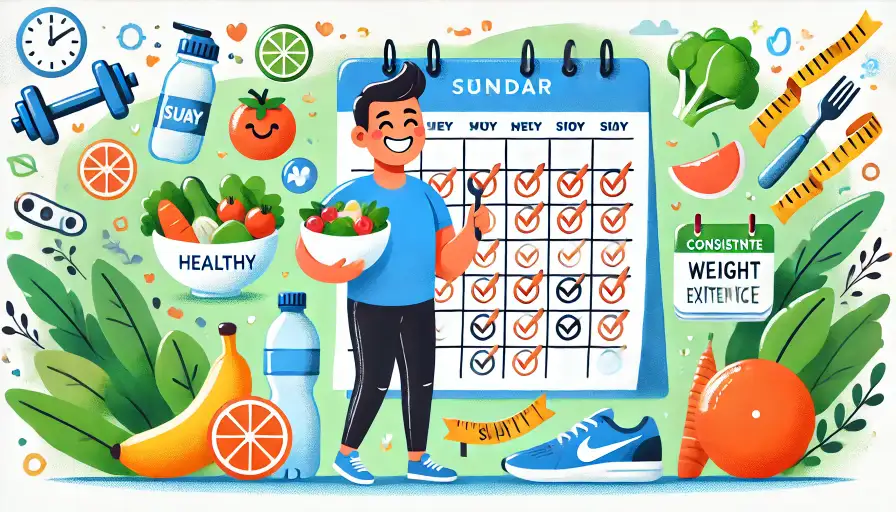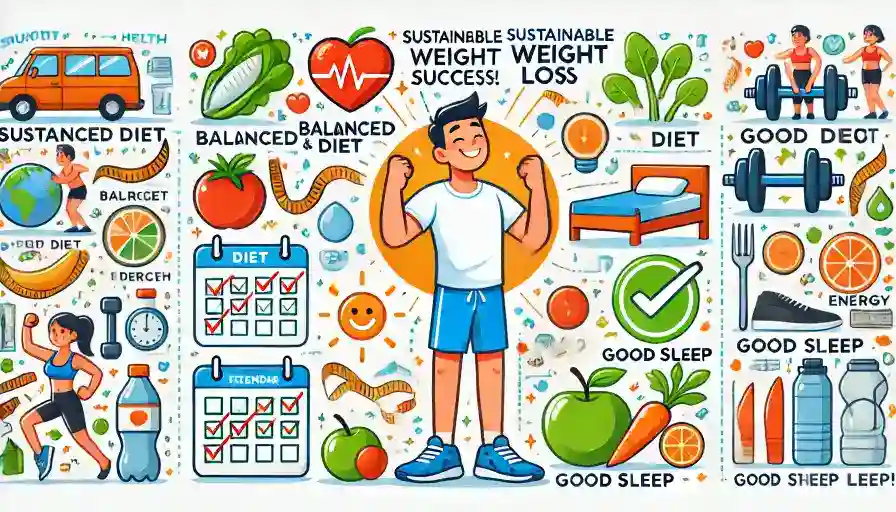Exploring the Vegetarian Diet: A Comprehensive Guide to Going Meatless
Learn about the different types of vegetarian diets, what to eat, health benefits, and how to incorporate more plant-based meals into your lifestyle.
Posted by
Related reading
Overcoming Weight Loss Plateaus: Understanding and Solutions
Learn what weight loss plateaus are, why they occur, and discover effective strategies to push past them and achieve your weight loss goals.
Mastering Meal Planning: Your Ultimate Guide to Healthier Eating
Discover the art of meal planning to save time and money while promoting healthier eating habits. Follow these simple steps for success.
Addressing Childhood Obesity: Practical Tips for Families
Explore effective strategies for combating childhood obesity and promoting healthy habits within families.
Finding Your Personal Motivation to Lose Weight
Discover how to identify your personal reasons for losing weight and stay motivated throughout your journey towards a healthier lifestyle.
Healthy Cooking at Home: 6 Strategies for Weight Loss
Discover the key benefits of home cooking and practical tips to make healthy meals that support weight loss goals without sacrificing flavor.

Understanding the Vegetarian Diet
In recent years, there's been a significant shift in the culinary landscape, with more people bidding farewell to meat for a variety of reasons. Whether it's for health benefits, environmental sustainability, ethical treatment of animals, or simply a matter of taste, the appeal of plant-based eating has never been stronger. As the movement grows, many individuals are left pondering what a vegetarian diet truly entails and how to embrace it in their daily lives.
What Constitutes a Vegetarian Diet?
The term 'vegetarian' encompasses a spectrum of eating habits, each tailored to the individual's preferences and ethical beliefs. At its core, a vegetarian diet limits or entirely excludes meat, but the specific definitions can vary widely. Here are the most prominent categories of vegetarianism:
-
Vegan Diets: These diets eliminate all forms of animal-derived products, including meat, poultry, fish, eggs, dairy, and even honey. Essentially, if it is sourced from an animal, it's off the table. This approach encourages individuals to rely solely on plant-based foods.
-
Vegetarian Diets: These individuals consume a variety of plant foods, as well as dairy and eggs, while avoiding all meat, poultry, and fish. This category provides a broader range of nutrients, making it easier to maintain a balanced diet.
-
Pescatarian Diets: Pescatarians include fish in their diet alongside plant-based foods but abstain from other meats and poultry. Some may also incorporate dairy and eggs, allowing for a more flexible approach.
-
Flexitarian Diets: This semi-vegetarian model embraces plant-based foods and dairy, with an occasional nod to meat, poultry, or fish. The flexibility is a major draw for those who want to reduce their meat intake without completely giving it up.
Foods to Embrace in a Vegetarian Diet
Transitioning to a vegetarian diet doesn't mean sacrificing variety or flavor. In fact, it opens the door to a plethora of nutritious foods that delight the palate. Here are some types of foods to incorporate:
-
Legumes, Beans, and Pulses: Foods such as lentils, black beans, chickpeas, and various peas are rich in protein and fiber, making them essential components of a vegetarian diet. They are also high in essential nutrients like iron and potassium.
-
Vegetables: A colorful array of vegetables is crucial for any vegetarian. Leafy greens (like kale and spinach), cruciferous vegetables (such as broccoli and cauliflower), and other types like bell peppers and sweet potatoes offer a range of vitamins and minerals.
-
Fruits: Fresh or frozen fruits are a fantastic source of vitamins, antioxidants, and fiber. Options range from berries to tropical fruits, ensuring an abundance of choices.
-
Dairy and Eggs: Including dairy products such as yogurt and cheese can enhance nutrient intake. Eggs are another excellent source of protein and can be prepared in countless ways.
-
Nuts and Seeds: A variety of nuts and seeds (such as almonds, chia seeds, and flaxseeds) provide healthy fats, fiber, and protein, making them great for snacks or added to meals.
-
Tofu and Soy Products: Tofu, tempeh, and edamame are all fantastic sources of plant-based protein and can serve as delightful meat substitutes in various dishes.
-
Whole Grains: Foods made from whole grains, like brown rice, quinoa, and whole-wheat pasta, are not only filling but also packed with nutrients.
-
Meat and Dairy Alternatives: The market has seen a surge in plant-based meat options that mimic the taste and texture of meat dishes, so you don’t have to feel deprived.
Incorporating Vegetarian Meals into Your Routine
Adopting a vegetarian lifestyle can sometimes feel overwhelming, but with some thoughtful planning, you can seamlessly blend these ingredients into your daily meals. Here are practical tips:
- Salads: Add chickpeas or other beans for protein instead of grilled chicken.
- Rice and Noodle Bowls: Enhance with leafy greens or mixed veggies.
- Stir-Fries: Use marinated tofu in place of meat for a satisfying dish.
- Cookouts: Opt for plant-based burgers as a flavorful alternative.
- Pasta Dishes: Swap ground beef for kidney beans in pasta sauces or casseroles.
- Tacos: Fill tortillas with a medley of mushrooms and black beans instead of meat.
Health Benefits of a Vegetarian Diet
Shifting to a vegetarian diet can yield numerous health benefits. Research shows that plant-based diets are associated with a reduced risk of various health concerns, including heart disease, diabetes, and certain types of cancer.
-
Heart Health: Studies indicate that individuals consuming more plant-based foods have lower risks of cardiovascular diseases.
-
Cancer Prevention: Although a direct link is still under investigation, many vegetables are packed with protective compounds that may help reduce cancer risk.
-
Diabetes Management: Findings suggest that vegetarians have a significantly lower risk of developing type 2 diabetes, likely due to healthier food choices overall.
-
Blood Pressure: Research also indicates that individuals reducing meat intake often benefit from lower blood pressure levels.
Considerations and Nutritional Balance
While a vegetarian diet is generally healthy, it's essential to ensure you’re getting adequate nutrition. Pay attention to key nutrients that may require additional focus:
-
Vitamin B12: This nutrient is primarily found in animal products, so if you're avoiding meat and dairy, consider fortified foods or supplements.
-
Iron: Plant-based sources like beans and spinach contain non-heme iron, which is less easily absorbed. Pairing these with vitamin C-rich foods can enhance absorption.
-
Omega-3 Fatty Acids: While fish is a common source, vegan options include flaxseeds and chia seeds, which provide ALA and can be converted in the body to the other omega-3s.
Starting a vegetarian diet may lead to increased fiber intake, which can cause temporary digestive discomfort. However, as your body adjusts, these effects typically subside.
A 5-Day Vegetarian Meal Plan
To guide you on your journey, here’s a 5-day vegetarian meal plan that combines flavor and nutrition:
- Day 1:
- Breakfast: Veggie Egg Cups
- Lunch: Lentil, Beet, Clementine & Kale Salad
- Snack: No-Cook Peanut Butter Cookie Dough Bites
- Dinner: Ravioli Lasagna Cups
- Day 2:
- Breakfast: Banana Lover’s Flourless Pancakes
- Lunch: Edamame & Brown Rice Salad
- Snack: Cheesy Kale Crisps
- Dinner: Cauliflower Crust Pizza
- Day 3:
- Breakfast: Sweet Potato Toast with Banana and Honey
- Lunch: Zucchini Noodles with Tomato and Basil Cream Sauce
- Snack: Apple “Fries” with Peanut Butter
- Dinner: Tex-Mex Veggie Bowls
- Day 4:
- Breakfast: Chocolate Peanut Butter-Banana Overnight Oats
- Lunch: Mediterranean Salad Pita Pockets
- Snack: Greek Yogurt Buffalo Dip
- Dinner: Lentil, Sweet Potato, and Cauliflower Bowl
- Day 5:
- Breakfast: Smashed Avocado and Egg Toast
- Lunch: Greek Salad Quinoa Bowls
- Snack: Lemon, Thyme, and Pecorino Popcorn
- Dinner: Rotini with Creamy Broccoli Sauce
Conclusion: Embracing a Vegetarian Diet
Venturing into the world of vegetarianism can be both an exciting and fulfilling journey. Whether you're ready to adopt a fully meatless lifestyle, or simply want to incorporate more plant-based meals into your diet, the key is to listen to your preferences and body. The health benefits tied to a plant-forward diet make it an appealing option, but remember that healthy eating reflects personal choices and enjoyment. Embrace the variety and richness that vegetarianism has to offer!
Other Interesting Articles

Sneaky Fitness: 5 Easy Exercises to Do While Brushing Your Teeth
Maximize your time by incorporating these five simple exercises into your daily routine while brushing your teeth. Learn how to stay active effortlessly!

Navigating Food Challenges at Work: Tips for a Healthier Office
Explore effective strategies to overcome common food challenges in the workplace and maintain a healthy lifestyle throughout your workday.

Is it Possible to Maintain Weight Loss in the Long Term? Proven Strategies and Insights
Discover the challenges and proven strategies for maintaining long-term weight loss, including insights into biological, behavioral, and environmental factors that can support sustainable weight management.

Good Strategies for Losing Weight: Effective and Sustainable Methods
Discover good strategies for losing weight, including diet, exercise, sleep, and the power of habit formation, to achieve sustainable weight loss.